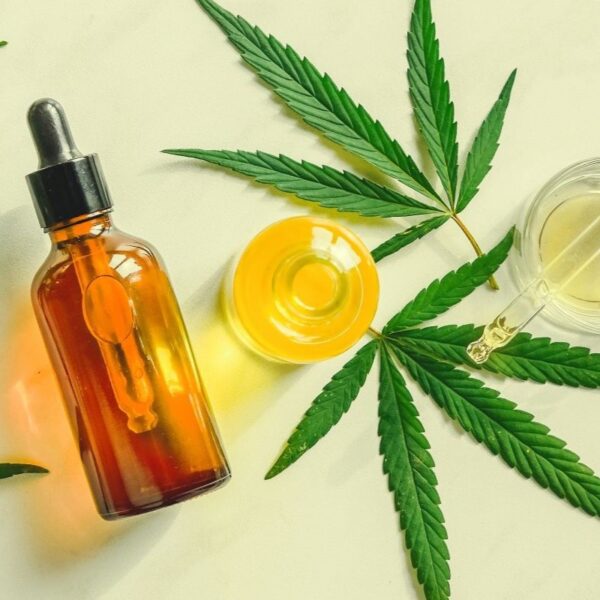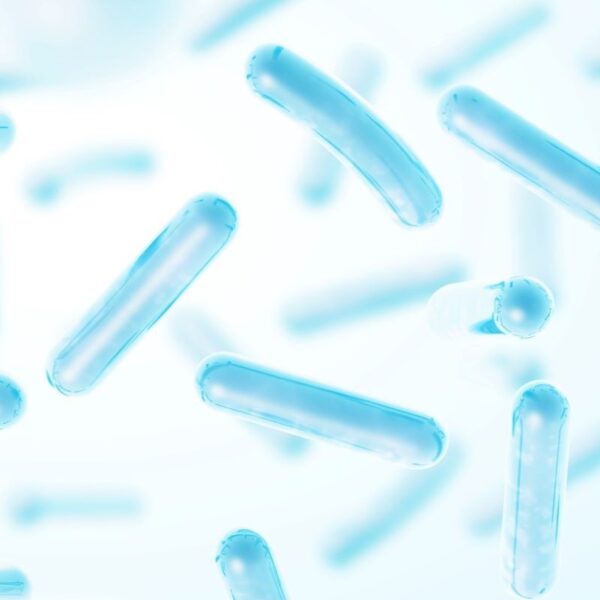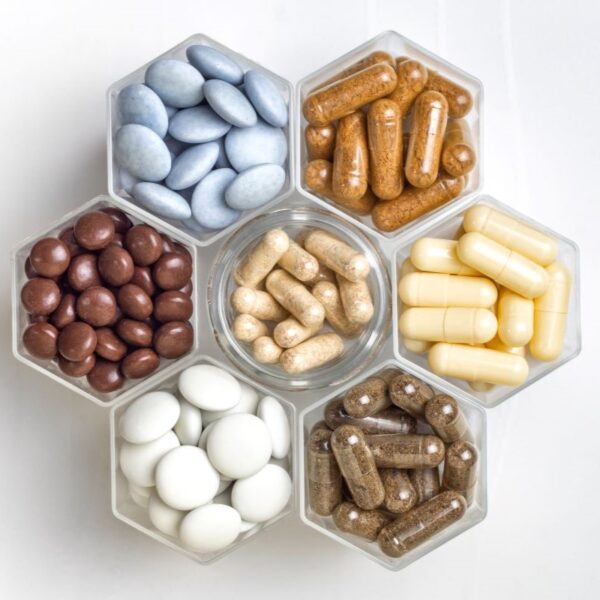In this article, we’ll examine the difference between CBD Distillate and CBD Isolate, examining the composition, properties, and formulation considerations.
Cannabidiol (CBD) is the primary non-psychotropic cannabinoid found in hemp (from Cannabis Sativa) and Cannabis (both Sativa and Indica varieties). CBD is a terpenophenol compound predominantly present in its acid form. It was isolated in 1940, and its structure was elucidated about two decades later by Raphael Mechoulam’s group. CBD is non-psychoactive, meaning it does not produce the “high” associated with marijuana use, which is generally attributed to delta-9-tetrahydrocannabinol (THC).
CBD has been extensively studied for its health and wellness benefits. It is gaining momentum due to its non-intoxicating profile and potentially natural calming effects. Overview of CBD isolates & CBD distillate.
- CBD isolate is made of Cannabidiol, which is 99%+ pure, with no other cannabinoids and no additives. This version is typically reduced into a crystal/powdered form and has no distinctive taste or smell.
- CBD distillate is a condensed version of the entire hemp plant, with more than 50%-70% CBD content. CBD distillate retains the vitamins, terpenes, fatty acids, and other cannabinoids naturally present in the plant. It has the same natural balance of chemicals as the hemp plant itself.
Isolate and distillate products have very different purposes from a consumer standpoint. When formulating products with CBD, it’s important to understand the benefits of each type to provide the best possible consumer experience.
Composition
| CBD Distillate | CBD Isolate | |
| Cannabidiol (CBD) Content | CBD distillate typically contains 75-85% percent cannabidiol. The cannabidiol content varies as per the applied extraction procedure. | CBD isolate is the purest CBD product, with 99%+ CBD content. |
| Other Cannabinoids | CBD distillate contains additional cannabinoids, including CBC, CBN, and CBG. | CBD isolate has all the other cannabinoids except cannabidiol eliminated from it. |
| Other Compounds | Terpenes are present in CBD distillate, providing a distinctive taste and smell. CBD distillate has a whole spectrum of vitamins, omega-3 and omega-6 fatty acids, terpenes, essential oils, flavonoids, and trace minerals. | CBD isolate does not contain other compounds naturally found in hemp, including terpenes and fatty acids. |
| Residual Solvents | CBD distillate is ideally free of residual solvent. | CBD isolate does not contain any residual solvents. |
| THC Content | Terpenes are present in CBD distillate, providing a distinctive taste and smell. CBD distillate has a spectrum of vitamins, omega-3 and omega-6 fatty acids, terpenes, essential oils, flavonoids, and trace minerals. | CBD isolate is free of THC content. |
Other Components
Cannabinoids
At least 113 distinct phytocannabinoids have been isolated from cannabis. However, only four (i.e., THC, CBD, CBC, and their common precursor CBG) have been demonstrated to have a biogenic origin.
| Cannabigerol (CBG) | CBG is found in most Cannabis varieties. It has shown relevant antibiotic effects and could decrease intraocular pressure. CBG has been deemed “inactive” in contrast to THC. It has analgesic and anti-inflammatory properties similar to CBD. Of several cannabinoids tested, CBG had the strongest potency to inhibit platelet aggregation. |
| Cannabichromene (CBC) | CBC is a non-psychotropic phytocannabinoid shown to be a potent TRPA1 agonist with anti-inflammatory and antimicrobial properties. Preclinical studies demonstrated the antitumor effect of both CBG and CBC against gastrointestinal cancer cells. CBC administration can induce nociception by itself. The effects of CBC can be augmented for additive results when THC is co-administered. |
| Cannabinol (CBN) | Cannabinol (CBN) is the nonenzymatic oxidation byproduct of THC and is most commonly an artifact found after prolonged storage, especially at higher temperatures. CBN can be sedative and anticonvulsant in animal and human studies and has demonstrated significant properties related to anti-inflammatory, antibiotic, and anti-MRSA activity. |
Terpenes
Hemp contains terpenes that give the plant its distinctive odor. Other than providing a unique scent, terpenes have certain health benefits and biological activity.
Method of Extraction
| CBD Distillate | CBD Isolate | |
| Extraction | The extraction method starts with eliminating unwanted plant materials. CBD distillate can be used as a raw material for obtaining CBD isolate. The method for obtaining CBD distillate can be altered per the requirements and further processing treatments. CBD distillate is subjected to further extraction for isolating CBD. Technically advanced procedures like CO2 extraction or supercritical fluid extraction can isolate CBD from all other compounds in hemp. This technique eliminates all plant compounds except cannabidiol without leaving harmful residuals. | After purification of distillate, the extract undergoes a recrystallization process. Recrystallization is achieved by dissolving the distillate in a solvent by heating and cooling (crashing). As the blend cools, the present cannabidiol molecules reunite into solid form, isolating themselves from other constituents, including THC. |
| Purification | The extraction method starts with eliminating unwanted plant materials. CBD distillate can be used as a raw material for obtaining CBD isolate. The process for obtaining CBD distillate can be altered per the requirements and further processing treatments. CBD distillate is subjected to further extraction for isolating CBD. Technically advanced procedures like CO2 extraction or supercritical fluid extraction can isolate CBD from all other compounds in hemp. This technique eliminates all plant compounds except cannabidiol without leaving harmful residuals. | After purification of distillate, the extract undergoes a recrystallization process. Recrystallization is achieved by dissolving the distillate in a solvent by heating and then cooling (crashing). As the blend cools, the present cannabidiol molecules reunite into solid form, isolating themselves from other constituents, including THC. |
Properties of CBD Distillate vs. CBD Isolate
| CBD Distillate | CBD Isolate | |
| Molecular Weight | Varies as per composition | 314.47 g/mol |
| Storage Conditions | 25 °C/60% RH in dark | 25 °C/60% RH in dark |
| Solubility in Water | Practically insoluble in water | 12.6 mg/L |
| Appearance | Golden viscous oil | White crystalline powder/liquid |
| Melting Point | Varies as per composition | 67.5 °C |
Formulation Considerations
Stability Characteristics of Both CBD Distillate & Isolate
| Attribute | Stability |
| Light | Sensitive |
| Heat | ThermolabileUnstable in higher pH even at 37 °C (Degradation temperature 140 °C) |
| Oxidative | Sensitive to oxidation |
| pH | Stable between pH 4 and 6 |
CBD is thermally unstable and very sensitive to photolytic reactions and oxidation. CBD powder is significantly more stable than CBD in oil solution. CBD isolate has a longer shelf life when stored in the suggested conditions as it contains a single ingredient. In contrast, CBD distillate has multiple components, all following different degradation kinetics.
Application Format
| CBD Distillate | CBD Isolate | |
| CBD Products | Edibles: CBD Oils, Gummies, Capsules, and TincturesOther: Vapes, Oils, Balms | Edibles: CBD Oils, Gummies, Capsules, and TincturesOther: Vapes, Oils, Balms, Creams |
| Food Enrichment | Food enrichment using CBD distillate comes with a few limitations, as the peculiar taste profile of hemp is retained in the distillate. Its taste, color, viscosity, and limited solubility in water makes formulating more challenging. | Food products can be enriched by CBD isolate. There is no impact on the taste profile of the food products as CBD isolate does not carry any unacceptable sensory properties. |
| Carriers | CBD distillate products can include carriers. | The powder form of CBD isolate makes efficient delivery into the system challenging. For this reason, CBD isolate products often include other ingredients, such as carrier oil. Because CBD is oleophilic, the use of oils can improve its bioavailability. |
Types of CBD Distillate
| Full Spectrum CBD Distillate | Broad-spectrum CBD is a distillate that does not contain THC. Creating broad-spectrum oil from distillate requires removing THC, but sometimes, this process can cause the formula to lose terpenes and potency. Broad-spectrum CBD products contain a wide range of cannabinoids, terpenes, and flavonoids.. All the benefits of cannabinoids, except the entourage effect of THC can be enjoyed with broad-spectrum CBD distillate. |
| Broad Spectrum CBD Distillate | Broad-spectrum CBD is a distillate that does not contain THC. Creating broad-spectrum oil from distillate requires removing THC, but sometimes, this process can cause the formula to lose terpenes and potency. Broad-spectrum CBD products contain a wide range of cannabinoids, terpenes, and flavonoids. All the benefits of cannabinoids, except the entourage effect of THC, can be enjoyed with broad-spectrum CBD distillate. |
Sensory Attributes
| CBD Distillate | CBD Isolate |
| CBD distillate carries the peculiar taste and aroma profile of hemp. | CBD isolates have no plant fragrances or taste since terpenes, the molecules behind the scent, are eliminated. |
Dosage
Users should start with smaller dosages of 5-25 mg CBD for CBD isolate. The dosage required to obtain the beneficial effect of CBD can be subjective to the individual. Some people might benefit from lower doses. Additionally, the body utilizes CBD better when it’s included in products that can increase its bioavailability.
It’s important to note that stronger does not necessarily mean better in CBD. The desired health benefits of CBD can be obtained only when the amount inside the body reaches a certain level. On the other hand, the effects of other cannabinoids can be seen to increase with dosage increases.
Benefits
| CBD Distillate | CBD Isolate |
| CBD isolate carries the benefits of cannabidiol. CBD isolate does not carry hemp’s peculiar taste and aroma, improving its acceptability. Can be used by users with plant allergies. It is easier to create products with CBD isolate being a single component. CBD isolate is user-friendly for first-time consumers as it contains only one compound. The dosage can easily be adjusted as needed. People who wish to take high doses of CBD may prefer a CBD isolate. Higher purity and higher cost. Cannabidiol isolates are suitable for people who undergo pre-employment THC screening tests. | CBD isolate carries the benefits of cannabidiol. CBD isolate does not carry hemp’s peculiar taste and aroma, improving its acceptability. Can be used by users with plant allergies. It is easier to create products with CBD isolate being a single component. CBD isolate is user-friendly for first-time consumers as it contains only one compound. The dosage can easily be adjusted as needed. People who wish to take high doses of CBD may prefer a CBD isolate. Higher purity and higher cost. Cannabidiol isolates are suitable for people who undergo pre-employment THC screening tests. |
Regulatory Information
The 2018 Farm Bill removed hemp from the legal definition of marijuana in the Controlled Substances Act. This made some hemp-derived CBD products with less than 0.3% THC federally legal. However, CBD products containing more than 0.3% THC still fall under the legal definition of marijuana, making them federally illegal but legal under some state laws.
The FDA has not approved nonprescription CBD products, and some products may be inaccurately labeled. Full-spectrum CBD products contain some THC, but usually in low quantities of less than 0.3%.
Fun Facts About CBD
- CBD works by interacting with the body’s endocannabinoid system, a complex network of receptors found throughout the body. This system helps regulate various physiological processes like pain, mood, immune function, and more.
- CBD is available in different forms, including oils, tinctures, capsules, gummies, topicals, and even beverages. Each form offers different absorption rates and durations of effect.








